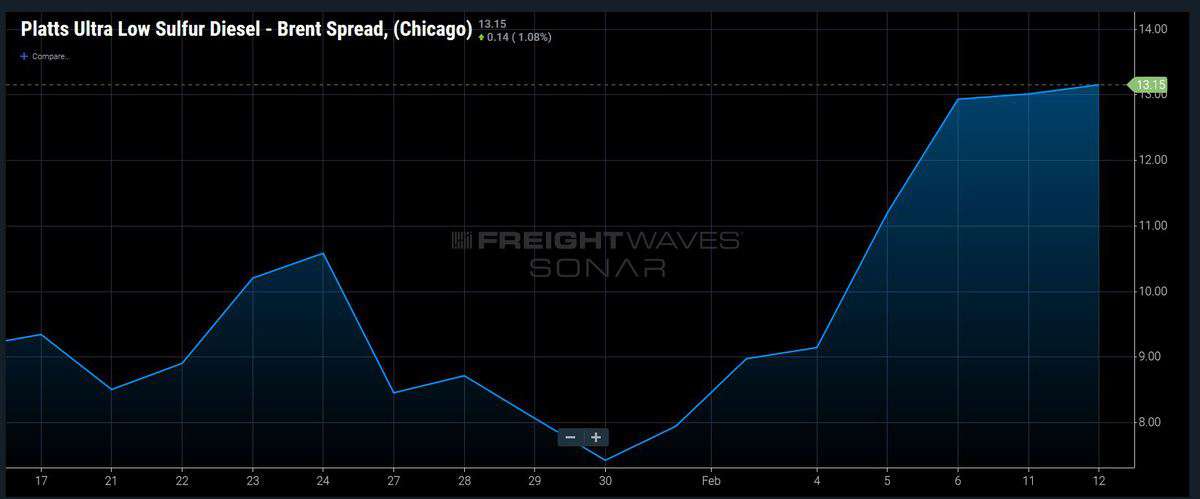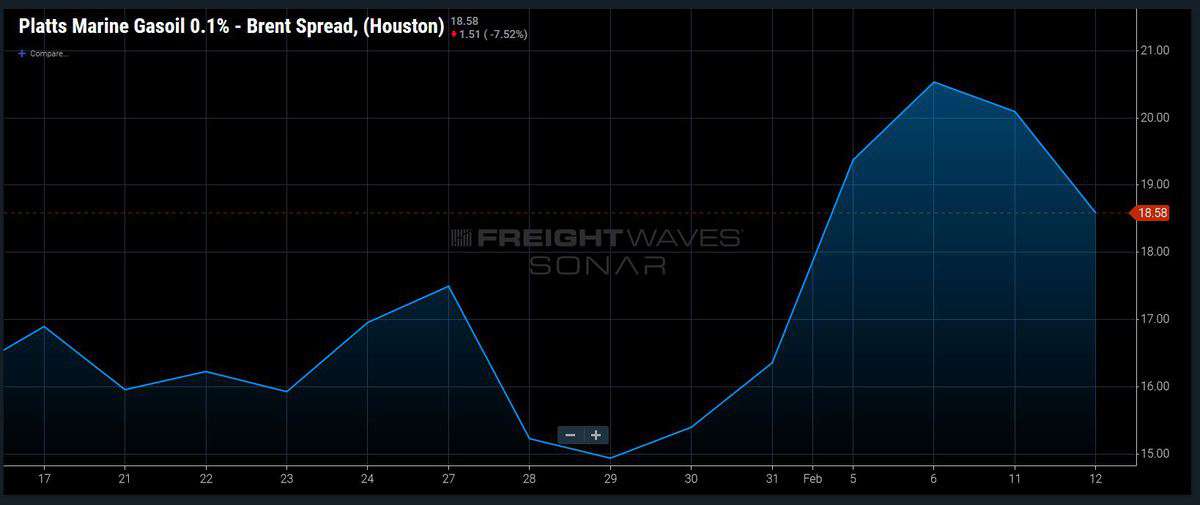In a just-released report loaded with good news for anybody consuming diesel fuel, a leading energy research company sees the diesel market staying weak well after taking a hit from the ongoing coronavirus scare.
The coronavirus outbreak has particularly weakened diesel prices, in part because of its immediate impact on air travel. That hits demand for jet fuel, which like diesel is a distillate. A drop in jet fuel demand weakens the entire distillate complex and would be expected to push some distillate molecules into the diesel market.
But according to the energy research firm of Energy Aspects, an end to the coronavirus crisis won’t result in a broad rebound in diesel markets. There has been something of a rebound in the relationship between the price of crude and diesel, and Energy Aspects refers to that several times in the report. For example, the spread between the S&P Global Platts assessment of crude oil benchmark dated Brent and the price of ultra low sulfur diesel (ULSD) in the area of the U.S. Midwest known as Group 3 closed last week at $13.21/barrel (b). At the end of January, the spread was $8.05/b. A simple spread comparison between Brent on the CME exchange and the ULSD contract on that exchange shows a number that closed last week at just over $14/b, but was down toward $10 at the end of January.

“Amid the uncertainty, we know that COVID-19 has not cured the market’s problem of refinery overcapacity,” Energy Aspects writes. “Our core view on the market is unchanged: diesel demand is growing too slowly to erode the overhang in refining capacity.”
The Energy Aspects report is notable in a few ways. First, it keeps its references to IMO 2020 to a minimum. Diesel prices in 2020 and even late 2019 were supposed to be higher because of the low-sulfur requirements of IMO 2020. Conventional wisdom saw IMO 2020 spurring demand of diesel molecules in a variety of product forms to meet the rule that restricts the use of high sulfur fuel oil (HSFO) to power ships. So far, it hasn’t happened.
“IMO-related distillate demand has all but disappeared,” the report said. Separately, the report talks about marine gasoil, an existing distillate product that was supposed to get a big boost from IMO 2020. “MGO demand is not emerging in sufficient quantities to mop up the excess,” the report said.

The other product that has been targeted to replace the HSFO displaced by IMO 2020 is very low sulfur fuel oil (VLSFO). The recipe for making VLSFO includes using a significant amount of a product called vacuum gasoil, which is an intermediate product that also can be used to make finished over-the-road diesel.
Energy Aspects doesn’t see much bullish news there either: “The slide in VLSFO cracks over the last month as supply has risen means there may be less blending demand for distillates than many hope for,” the report said.
In a report laden with numbers, Energy Aspects lays out the case that there is an imbalance in the diesel market that isn’t going to simply snap back after the coronavirus scare ends. Chinese refiners have cut back their operations, the report said, but they “will be looking to boost output sooner rather than later, and higher product cracks will only facilitate the recovery in runs.” The report sees Chinese diesel supply exceeding demand by more than 500,000 barrels per day (b/d) this quarter, with exports being the likely way in which the Chinese industry tries to balance itself. “The market’s expectation that Chinese oil product exports will fall sharply looks misplaced,” Energy Aspects writes.
On top of Energy Aspects’ view that refinery runs will likely snap back by the second quarter, Chinese refiners are going to add about 400,000 b/d of new capacity this year, the report said.
But the report doesn’t focus just on China. In a section bluntly titled “Weak demand trumps run cuts every time,” Energy Aspects looks at the situation in Europe, specifically France. Preliminary data shows that French demand in January, primarily because of the warm winter, dropped about 90,000 b/d last month, a drop of more than 9% year-on-year. Heating oil sales were down by 20%. The report then recaps similar data from other European nations, such as Spain.
Those in the market who are projecting higher prices, according to Energy Aspects, are missing what it sees as a key point: “When demand is weak, refiners cannot be counted on to cut runs to the point that the market becomes bullish on a sustainable basis.” Instead, the refiners “often err by cutting too little or lifting cuts as soon as prices are more favorable.”
Energy Aspects doesn’t see this weakness as manifesting itself immediately. Refineries are going into “turnaround” season, when maintenance is undertaken as facilities get ready to start pumping out gasoline for the warmer months. In the second quarter, the report said, the margins between diesel and crude will be supported by “the old adage of not shorting refining products during turnarounds.”
But after that – ”from June onwards,” the report said, “this looks like a very challenged market without a meaningful pick-up in demand or a permanent reduction in refining capacity, since any strength in cracks will wipe out run cuts.”







